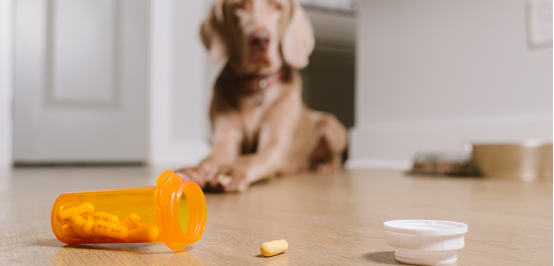Many of us take vitamin or dietary supplements to keep our health in check, but these same supplements that can be helpful to us, may be dangerous or even fatal to our pets. Whether this is due to the ingredient we are looking to take or the inactive ingredients in the product, it is important to keep these supplements out of paw’s reach. The ASPCA Animal Poison Control Center (APCC) has provided a brief look into some common supplements that can be harmful to our furry friends.

Alpha lipoic acid (aka thioctic acid) is a vitamin-like antioxidant that is found in many foods such as yeast, broccoli, spinach, potatoes and meat. It is often taken to decrease inflammation, slow skin aging, lower heart disease risk factors, slow memory loss, reduce blood sugars, promote weight loss and to improve nerve function. However, pets that get into thioctic acid may develop a drop in their blood sugar due to its synergism with insulin. Clinical signs of overdose will often include drooling, vomiting, difficulty walking, tremors and seizures. These effects can be seen within 30 minutes to two hours after an overdose. Left untreated, this overdose may be fatal to pets, but with prompt veterinary treatment, most pets will recover.
Coffee extracts are often found in supplements in the forms of green tea extract, coffee and guarana. Humans often take these supplements to jump start their metabolism to assist in weight loss or to maintain wakefulness. Alternatively, for our four-legged friends, overdosing on these supplements may cause vomiting, restlessness and hyperactivity, increased thirst and increased urination, elevated heart rate, elevated blood pressure, tremors and seizures. In some cases, very high doses of caffeine may lead to death.
Iron is taken by many people as our diets are often deficient. While taking iron may be beneficial to most humans, in pets high doses of iron can be irritating and caustic to the GI tract leading to vomiting, diarrhea and, in high doses, can cause liver damage.
Vitamin D3 is a commonly recommended vitamin for humans as we are often deficient due to poor diet or lack of exposure to sunlight. For our furry counterparts, overdoses of Vitamin D will often lead to vomiting, diarrhea and lack of appetite. In very high doses, calcium levels in the body elevate which may lead to kidney damage and mineralization of the soft tissues.
Xylitol, which is now found in more and more supplements – especially those that are chewable or fast-melting – can be very toxic to pets, causing low blood sugar and liver injury in dogs.
It is important to remember that this list only covers a few vitamin and dietary supplements.
If your pet ingests something potentially toxic, contact your veterinarian immediately so that proper treatment can be started as soon as possible.
Posted time: 15/01/2021


 008613937194080
008613937194080
 bellaliu@miraclebio-tech.com
bellaliu@miraclebio-tech.com

 Tel:008613937194080
Tel:008613937194080
 Office Add:
Office Add:  Factory Add:
Factory Add: 
